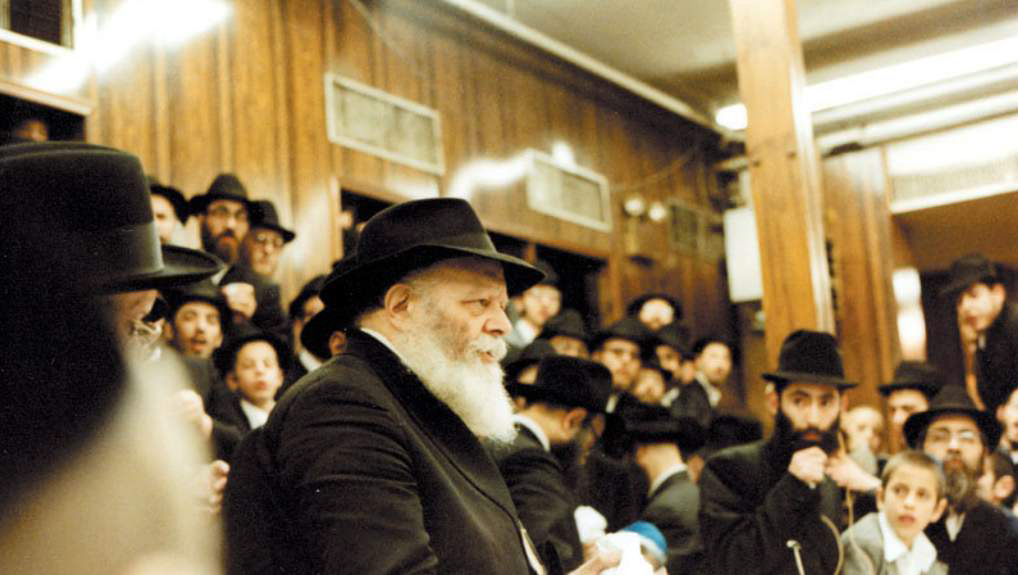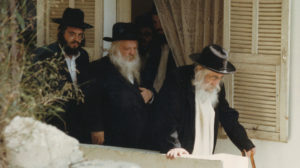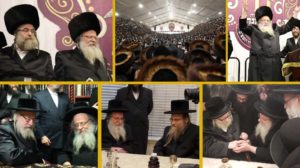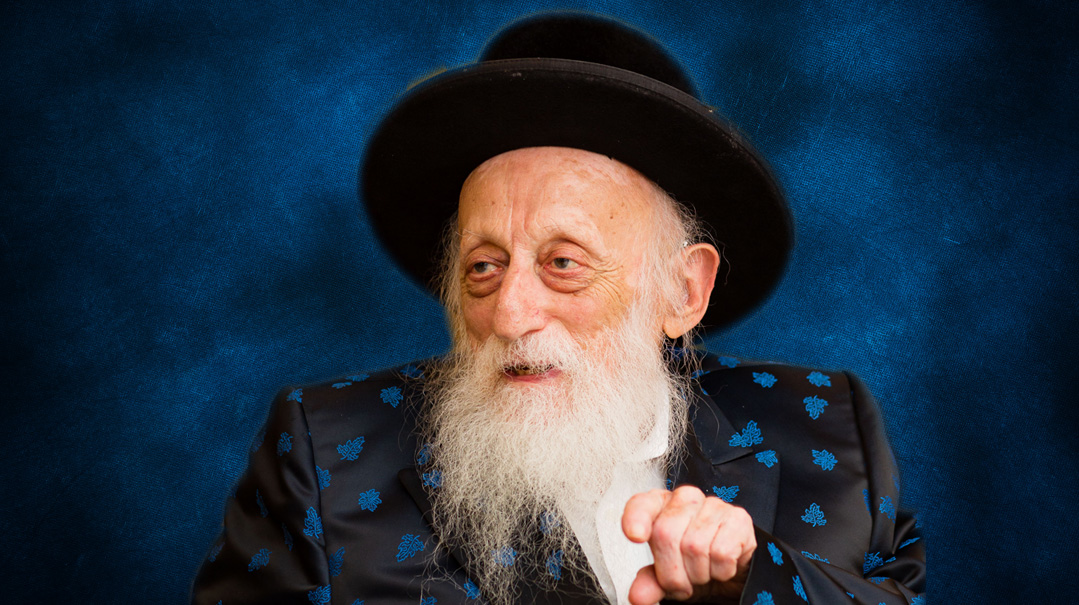Close Encounters

The Lubavitcher Rebbe inspired untold numbers of people through his farbrengens, correspondence (he received more mail daily than anyone else in the US besides the president), and personal audiences. While there are many fascinating stories about gedolim from all circles, “we’re getting the real stories from the people they happened to,” says Yechiel Cagen, director of an ambitious project called “My Encounter with the Rebbe.”
Under the auspices of Jewish Educational Media, Chabad-Lubavitch’s audio, video, and photographic archive and production house, Cagen has in the last ten years collected over 940 interviews and over 15,000 pages of transcripts of people from all walks of life — from roshei yeshivah to prime ministers to Israeli generals — who’ve willingly shared their personal encounters in front of the camera.
For Cagen though, it’s a race against time. “Many of the people who had the longer, in-depth conversations with the Rebbe in the 1940s, ’50s, and even ’60s — are no longer alive.”
How does Cagen know the stories all these people tell him are accurate? “As historians, we need to make sure we’re getting good information,” he explains. “After a pre-interview, we discuss the material: Does the story add up? Does it make sense? We’ll check with others to make sure the person isn’t misremembering.”
But while most of his work is focused on the past, Cagen says it’s really all about the present. “People hear things that the Rebbe told someone 60 years ago, and in those words, many find guidance to life’s challenges today. What we’re doing is bridging the past and the future.”
Here are some of those stories.

Chassid in Camouflage
— Rabbi Benjamin Blech —
O
ne year, I took a sabbatical to write a book, when I get a call from Lubavitch. I think it was Rabbi Groner, one of the Rebbe’s secretaries, and he said, “We understand you have a sabbatical. The Rebbe wants to meet with you.”
You can imagine what a fantastic thing that was, a private meeting with the Rebbe at his request. I say, “Why does the Rebbe want to meet me?”
He says, “The Rebbe would like you to go to the Far East. We have a list of places — Australia, New Zealand, Singapore, Bangkok, Hong Kong, Tokyo — to draw Jews closer to Judaism.”
“You want me to go raise money for Lubavitch?”
They said, “Who’s talking about raising money? We will take care of all finances involved, hotels… We’ll put you up all over. We have Lubavitchers in every one of these places. We know that you can speak well and that you can give lectures and teach about things that will draw Jews closer…”
Now, I don’t have a beard, I don’t look like a Lubavitcher, I don’t wear a black hat; I look like a Modern Orthodox Jew. I say, “Are you sure you have the right person?”
And they say, “We know everything about you.”
So I come in, and the Rebbe explains to me that they have emissaries in these various places. “We want to you go there, talk to Jews and draw them near. Teach them, tell them the things that you, as a rabbi and a teacher, know could ignite the spark that’s in their souls.”
I spent almost three months going to all these places and giving lectures everywhere. After I came back, I met with the Rebbe again. He congratulated me, told me he was very happy, and then he said, “I want to tell you something. I knew this about you — you’re a chassid in camouflage.” He saw the inside, not the external. Really, he understood that every Jew is just in camouflage.
Rabbi Benjamin Blech is a lecturer, author of 12 books on Judaism, and was rabbi of the Young Israel of Oceanside for 37 years.
Dare to Believe
— Professor Reuven Feuerstein —
M
y belief that it’s possible for people with genetic disorders, chromosomal disorders, to be turned into normal functioning individuals and good, practicing Jews, was a daring thing, because at that time people didn’t believe it was possible. People would ask me, “How do you dare tell people that this child will ever be able to speak? How do you dare say that this child will be able to read? To finish school? To go to yeshivah?”
Much of this power of belief came from my interactions with the Rebbe. Wherever I traveled for my work, parents would contact me: “The Rebbe wants you to see our child.” One particular case involved a boy from a European country who was considered mentally defective and placed in a school for deficient children. But the school wasn’t Jewish, and he learned real problem behaviors there.
The father wasn’t a very religious person, but he came to the Rebbe. The Rebbe told him to bring his son to me. So the boy came to Jerusalem. We taught him to read. He would sit in my office with a sefer Tehillim. The Rebbe told him to finish the sefer every week, which he did for the three years he was at our institute. We were already patting ourselves on the back, when this young man got in with a horrible crowd and ran away.
I spoke to the Rebbe about the situation. “Don’t give up on him,” he said. “Don’t let him out of your hands. Continue.” He even suggested someone who could take him out of that place. I didn’t think it would be possible, but the Rebbe said to do it.
So I sent somebody to extricate this young man from these terrible people — by that time there was no sin he was not involved with. But he came back. He’s now the father of four children, two of them learning in yeshivah, and they are the only grandchildren of this family who have brought the grandparents nachas.
You might say I’m a “good psychologist,” but usually in such cases we raise our hands and give up. Not the Rebbe. I must tell you something: Psychology, as it is taught, is very limited in terms of our understanding of the other. It’s limited by how we see ourselves. But the Rebbe saw people differently. The way he said, “Yes, do it!” means he saw each person as something that comes directly from a G-dly source.
Reuven Feuerstein z”l, founder of the Feuerstein Institute in Jerusalem, was a clinical, developmental, and cognitive psychologist, renowned for his theory that intelligence is modifiable even among the mentally challenged.
A Jew from Maryland
— Rabbi Tzvi Hersh Weinreb —
T
hree years after we married, my wife and I moved to Silver Spring, Maryland, where I attended the University of Maryland. I received a PhD in psychology and began working as a psychologist in the local school system. Besides this, I used to give classes in Talmud — one on Shabbos afternoon for the general public, and one on Tuesday night for a smaller group who wanted to learn on a deeper level.
I was in my early 30s, so I suppose I was too young for a midlife crisis — but around this time, I was torn with a number of very pressing questions.
Should I stay in Torah learning, or should I continue in psychology? And if so, how should I further my career? Should I move into private psychotherapy work, or accept an offer from one of the county social service organizations in the area? Also, I wasn’t sure what was best for my children in terms of educational options in Silver Spring.
All these questions had me depressed, and I was unsure what to do or where to go. I spoke to various close friends, and one of them — a Chabad chassid — suggested that I contact the Rebbe.
And so it was that in February 1971 I called the Rebbe.
The Rebbe’s secretary answered the phone in English, with a simple, “Hello, who’s this?”
As I was talking to the secretary, in the background — I recognized his voice — the Rebbe was asking in Yiddish, “Who’s calling?”
I replied, “A Yid fun Maryland — A Jew from Maryland.”
I told the secretary that I had many questions that I wanted to discuss with the Rebbe — questions about what direction my life should take, questions regarding my career, questions of faith… I explained that I was at a very uncertain stage in my life and I didn’t know where to turn.
I spoke in English and, as I was talking, the Rebbe’s secretary was repeating my words in Yiddish. And then I heard the Rebbe say in the background, “Tell him that there is a Jew who lives in Maryland that he can speak to. Der Yid hayst Veinreb — his name is Weinreb.”
Now, I couldn’t believe my ears. The secretary repeated the Rebbe’s words to me: “S’iz doh a Yid in Maryland mit vemen er zol redden. Zayn numen iz Veinreb.”
So I replied, “But my name is Weinreb!”
And then I heard the Rebbe say, “Oib azoi, zol er visen zayn az amol darf men reden tzu zich — If that’s the case, then he should know that, sometimes, one needs to speak to himself.”
The Rebbe could have picked up the phone and told me what to do, but I wouldn’t necessarily have listened. Like many people, I suppose I had a natural resistance to being told by others what to do, and I think the Rebbe had insight to know that it was better if I heard the answer from myself than if I heard the answer from him. So before you go asking another person, first talk to yourself and listen to what you have to say about it — sometimes your own advice is the best advice.
Rabbi Dr. Tzvi Hersh Weinreb is an ordained rabbi, a qualified psychotherapist, longtime rabbi of Shomrei Emunah in Baltimore, and the executive vice president emeritus of the Orthodox Union.
Just Desserts
— David Mintz —
A few years after our company [Tofutti] went public in 1983, I get a call from the chairman and president of Ralston Purina. I believe at that time they were doing over $40 billion in sales. The president said, “I would like very much to have lunch with you.”
I said, “Oh, I’d be honored. When will you be in town?”
He says, “I thought we’d have it today. I’ll send a jet to pick you up at noon.”
I took along my CFO and in less than an hour we were in St. Louis.
They take us up to the penthouse on the 50th floor, and the chairman enters and introduces himself. He says, “We won’t waste your time. I’ll just tell you why I’ve asked you to come. I’d like to make an offer for a minority interest in your company. I’m prepared to give you a check for $20 million to start.”
My associate almost couldn’t catch his breath. I said, “Let me discuss it with my board…”
The first thing I did was to call the Rebbe. I told Rabbi Groner, “This is what’s going on. Can you ask the Rebbe?”
He gets back to me a couple of hours later. This is what the Rebbe said: “B’shum oifen nisht — Absolutely not!” He said, “It’s a very nice offer, but it’s not for you. If it’s worthwhile for them to invest the $20 million, it’s much more worthwhile for you to refuse.”
We had a board meeting the following day, and everyone was excited. I said, “Gentlemen, before you go any further, I’d like to tell you how I feel. Whether you agree or not, this is what I’ve decided. With all due respect to the board, I’m going to turn it down.”
So everyone jumped up, “Are you out of your mind?! This is a golden opportunity! You have a fever or something?” They thought I lost my marbles.
I didn’t want to go into the Rebbe thing, so I just said, “With G-d’s help, we’ll do well without it.”
Later, when they did more research, they came to me and said, “How did you have the foresight?!” It turns out that Ralston Purina was notorious for buying into small companies and then taking them for a ride like a toy. For them, $20 million was like play money. After a while they would lose interest and the company just disappeared.
David Mintz is founder and CEO of Tofutti nondairy products and desserts.
Food for Thought
— Rabbi Efraim Sturm—
I
t was the early 1960s, and we were seeing how too many Orthodox men and women who were going to out-of-town colleges were dropping Yiddishkeit and intermarrying. I called together the officers of Young Israel, and we decided to ask a number of Jewish leaders what to do.
I remember that one of them said we have to make sure that there are more Orthodox college professors. Another said that we have to make sure that the Jewish high schools imbue Yiddishkeit in their students so that they are able to withstand the pressures of college. Another said that we in Young Israel should issue a proclamation that nobody is allowed to go to an out-of-town college.
And then we went to the Rebbe.
The Rebbe analyzed what was really happening here. He said, “In Berlin, if you were a religious Jew, you had to defend your religion. You had to be able to answer people who challenged you. But Americans are not interested in defending religious philosophies. They are more interested in consistency. If a person is religious consistently, the average American will respect him.
“So, let’s look at what consistency means. A religious boy or girl goes to an out-of-town college, and says to the parents: ‘Don’t worry, I’ll observe Shabbos and I’ll keep kosher. I’ll have cottage cheese every day for lunch, I’ll have salad every day for dinner, and I’ll have cornflakes every day for breakfast… I’ll manage for four years.’ Maybe they mean it, maybe they don’t mean it. Let’s assume they mean it. But can they do it?
“Imagine a young man sitting in a college dining room with his non-Jewish peers,” the Rebbe continued. “How long is he going to put on his yarmulke and eat cottage cheese every single day? And what is he going to do when a girl says to him, ‘Take a taste of my lunch, it’s delicious!’ After a while, the peer group will pressure him — not because they’re opposed to what he’s doing, but because that’s just how life is. And in the liberal atmosphere of the college campus, how can he not yield to that pressure?”
The Rebbe gave us his advice: “What you have to do is create a program to bring together all the young Jewish men and women in one place at the most vulnerable time. That most vulnerable time is not in the classroom when they are each interested in their own notes or their own marks, but in the non-classroom area. The best thing is to establish kosher dining clubs on college campuses.”
This was his practical solution. And so Young Israel started kosher dining clubs, which were hugely successful. These clubs became places where Orthodox men and women could eat, meet, and be protected from outside influences.
Rabbi Efraim Sturm served for 36 years as Young Israel’s executive vice president and chief executive officer.
Wired for the Future
— Jack Hardoff —
After fighting in Israel’s War of Independence, I went to New York to study at Brooklyn Polytechnic Institute. In the 1950s, I was working in New York as an interior contractor and, in the course of my work, I befriended Rabbi Yechezkel Besser, who was close to the Lubavitcher Rebbe. So when I became engaged, Rabbi Besser arranged for a blessing for my bride and me from the Rebbe. I assumed it was because of my bride’s lineage — she is a sixth-generation descendant of the founder of Chabad, Rav Shneur Zalman of Liadi. We were thrilled just the same. It was a snowy day in January 1956 when we arrived at Chabad headquarters in Crown Heights.
I asked the Rebbe whether we should speak in English or Hebrew, and he said, “Italian, German, or French would also be fine.” When he registered my surprise, he said, “I studied in France and I speak French,” and he told me that he received a degree in electrical engineering when studying in Paris.
I said, “You are an electrical engineer?”
And he nodded. “When I came to this country in 1941, I wanted to contribute to the war effort, so I worked at the Brooklyn Navy Yard, supervising electrical work on ships.”
I was astonished. Then he said, “I mentioned this because I hear from Rabbi Besser that you are an electrical engineer yourself, and a very knowledgeable one at that. If you don’t mind, I’d like to ask you some questions.”
And that’s how our discussion turned to the newest advances in electronics. He said, “I want you to explain some things to me. I hear that there is something new coming in called a solid-state transistor. Can you tell me what it’s all about — how it works?”
What was to be a 15-minute meeting lasted close to two hours. He pulled out a yellow pad, I came over to his desk, and we started drawing diagrams.
We compared the size of a little transistor, which is a quarter-inch by a quarter-inch, to a vacuum tube, which is four inches high and over an inch wide. We compared the fact that transistors use very low voltages — five volts, six volts, at maximum twelve — to the audio amplifiers of the day, which were using 450 volts.
He also asked me about using electric rheostats, rotary devices that control the speed of motors. “Will solid-state allow for devices that are not as big, clumsy, and heavy as the rheostats, the variable speed controllers?”
I told him that, as far as I knew, they were already working on developing solid-state speed controls. He was eager to know as much as possible about the developments in solid-state versus vacuum tubes, in controls, motors, and amplifications. I couldn’t believe he knew about all these things, and I was amazed at the insight he had into the future, into possibilities, into potentials.
When we finished and he gave us the blessing for many years of happiness of married life, he said to me, “You know, Yaakov ben Eliezer, when people come here to see me, I am the rabbi and they’re the pupils. But today you were the rabbi and I was the pupil.”
Mr. Jack Hardoff z”l, an electrical engineer, lived in Miami, Florida.
The Vegetable Store
— Rabbi Chaim Brovender —
I
t was 1967, and in those days, the Rebbe learned and worked all day, and then would see people all night. It sounds like he never slept — that may in fact have been the case, I don’t know. All I know is that we went in at 3 a.m.
The Rebbe didn’t say: “What do you want? What’s the purpose of this meeting?” Instead the Rebbe said, “What’s your name? What do you do? Oh, you’re from Israel…?” He started asking us, “When did you go? What do you do in Israel? Where do you live?” Things like that.
So I said to him, “We made aliyah in 1965, and I learn in a kollel.” I also went to university, but I don’t think I mentioned that. I went to university a little bit, but mostly I was learning in kollel.
“Where’s the kollel?”
“Yerushalayim.”
“Very nice… Where do you live?” the Rebbe asked.
“Kiryat Moshe.”
Now, everybody knows that the Rebbe was never in Israel. Kiryat Moshe is a neighborhood in Jerusalem. So I figure that’s the limit of the detail. Then the Rebbe says, “What street do you live on?”
I really didn’t take it seriously, but I answered, “I live on Reines Street.”
The Rebbe looks at me and he asks, “Is the vegetable store still there?”
I don’t know what he’s talking about! A vegetable store?
So Miriam, my wife, says to me, “Yeah, downstairs…” There were two exits to our building. One was the exit you usually used, and then there was kind of an exit through the basement. And in the basement there was a vegetable store. My wife says, “You know the vegetable store, downstairs there’s a vegetable store!”
I said, “I guess he’s right…” I couldn’t believe it! Everybody knows that the Rebbe had a good memory; everybody knows that he remembered all kinds of things that other people don’t usually remember. But to remember that there’s a vegetable store in a basement on Reines Street, when he had never been in Jerusalem?
Rabbi Chaim Brovender founded Yeshivat Hamivtar for American students over 35 years ago, on the advice of the Lubavitcher Rebbe. He later founded its women’s branch, Michlelet Bruria, later to become Midreshet Lindenbaum. Today he runs WebYeshiva, an online interactive yeshivah program.
Blessing for Success
— Rabbi Moshe Lerer —
I
n 1982, I was involved with the Long Island Committee on Soviet Jewry and I, along with another fellow, were chosen to go to Russia. Once I was chosen I wanted to do something concrete there, so I contacted Lubavitch and I was introduced to two people, Rabbis Moshe Levertov and Gedalia Korf. I said to them, “I’m going to Russia for two weeks, and I’d like to do something for Lubavitch, because I know you people do tremendous work over there.” They gave me a duffel bag full of things to take — mezuzahs, tefillin, siddurim, copies of the Tanya, matzah, and so forth. I had no papers that said that I was a rabbi. I even had a different social security card — no driver’s license, nothing. For the first and last time in my life, I wore dungarees, a dungaree jacket, and a dungaree cap.
My Chabad contacts tipped me off to certain things; they told me what to say, what not to say, where to go, where not to go. They gave me addresses and names of people to see in Moscow and Leningrad.
The day before I left for Russia, there was a farbrengen at 770, and they brought me to the Rebbe to a get a blessing for success in this mission. The place was very crowded and they pushed me up — I think I walked over some heads and stood on somebody’s hat. But I got to the Rebbe and he gave me a specifically worded blessing for the journey — a blessing that might have saved my life, as it turned out.
In the Soviet Union, I was under surveillance. In my hotel room I found a microphone hidden in the lamp. I had been warned not to talk in the room about anything important — just about the weather or sports, but not about politics, and not in Yiddish or Hebrew.
I met with Reb Mottel Lifshitz, Chabad’s underground shochet, and I also got a chance to meet “the tzaddik of Leningrad,” Reb Yitzchak Kogan, who asked me to be mesader kiddushin at a wedding. So I met with the chassan and kallah, and I learned that the chassan didn’t have a tallis or tefillin. I told him it would be my privilege to give him my own personal tefillin as a wedding present. I needed it for Shacharis the next morning, but right afterward, they would be his for the rest of his life.
But something happened, and he didn’t show up at the meeting place we had made up. Maybe I should have given him the tefillin the previous day — but I had never missed putting on tefillin in my life, so how could I? As I got on the bus going back to the airport, I saw a man running. He had come for the tefillin. I gave them to him, and we spoke briefly in Hebrew. But the tourist guide heard us, and she informed against me.
As soon as I got to the airport, they stopped me. “What do you have in your suitcase?” they demanded. I had nothing, because I had given everything away. But they took me to an interrogation room anyway — bare walls, one naked lightbulb. And they started in on me: “Who are you? What are you doing here? Where is your passport?”
I was saying Vidui under my breath. I was thinking that they would send me to Siberia and nobody would ever know where I was. But after about half an hour, they suddenly let me go. And I am absolutely sure that it was because of the Rebbe’s blessing. The Rebbe had said that I would succeed, that I would accomplish what I set out to do, and that I would return home safe and sound. And that’s what happened.
Rabbi Moshe Lerer is chaplain of Pilgrim Psychiatric Hospital in Brentwood, New York. He is an active member of the Rabbinical Council of Far Rockaway and the Five Towns.
Oops! We could not locate your form.











